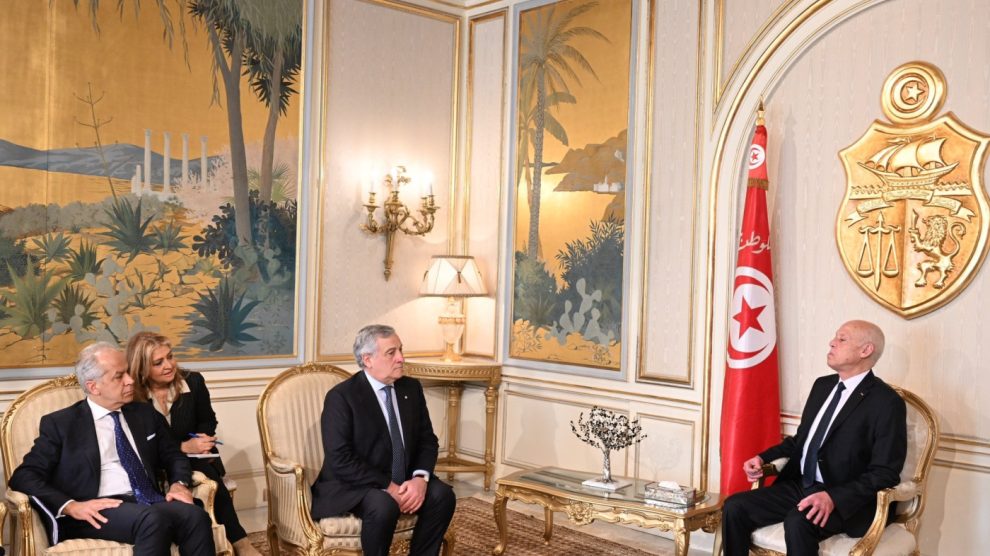Tajani & Piantedosi in Tunisia. On Wednesday, the Italian Foreign and Interior Affairs Ministers travelled to Tunis as Rome seeks to strengthen its ties with MENA capitals. The duo met with Tunisian President Kais Saied and their respective counterparts, Othman Jerandi and Taoufik Chareffeddin, to discuss how to reinforce bilateral cooperation on security, migration policies and development.
- The visit preludes Prime Minister Giorgia Meloni’s upcoming trip to Algeria and Libya, on Sunday and Monday respectively.
- FM Tajani was in Turkey just last week, and Defence Minister Guido Crosetto travelled to Azerbaijan.
The expert weighs in. Rome’s dialogue with Tunis is crucial to prevent what Alessia Melcangi, Senior Fellow at the Atlantic Council and professor at the Sapienza University in Rome, calls the “perfect storm,” – i.e. the risk of Tunisia’s economic (and social) collapse, which would have uncontrollable knock-on effects on migratory flows and the stability of the entire Mediterranean area.
- “Cooperation between Italy and Tunisia has always had its own value for Italian governments; it’s a longstanding tradition,” mainly centred on security and migration as well as bilateral ties and commerce, she told our sister website.
- Professor Melcangi also noted the United States’ renewed interest in North Africa (showcased by the CIA director’s recent trip), which surely placed the Rome-Tunis ties in even sharper focus.
Growth potential – hinged on energy. The expert spoke of ample opportunities for increased economic exchange, especially in the energy sector, which has a newfound centrality as the European Union diversifies away from Russian gas. That was recently expanded with the launch of the (EU-funded) ElMed, a 230 km underwater electric link connecting Tunisia to mainland Italy through Sicily, supported by Italy’s Terna and Tunisia’s Steg.
- Professor Melcangi believes ElMed represents “an opportunity for […] energy, and therefore economic integration between Mediterranean countries, linked to the diversification of sources, and on which Italian-Tunisian relations are jointly aiming and basing part of the renewal of collaboration.”
- The same stretch of sea is also crossed by the TransMed gas pipeline, delivering Algerian gas through Tunisia.
Stability, democracy, and the president. However, in addressing the Tunisian reality, any sort of cooperation is dependent on assisting the country in overcoming the socio-political and economic crisis it is experiencing. “The situation in Tunisia is very dangerous,” noted the expert, “with the latest parliamentary votes being a setback for President Saied’s quest for consensus, indicating a turnaround in public participation in voting.”
- More than 90% abstained in the last elections; that, compared to previous votes, “tells us that the popular support and trust of Tunisians towards the presidency and Mr Said’s hyper-presidentialist turn is waning,” she remarked.
- It’s also a setback for Tunisia’s democratic development, but not a slowdown in the activity and involvement that the population wants to have in the debate and in that path itself. In fact, the abstentions were a conscious choice, a form of protest and boycott, and not a consequence of apathy, she pointed out.
Bottom line: Now that dissent is spreading, the problem, remarked Professor Melcangi, is that the country is facing a deep economic crisis. The only lifeline would have been the International Monetary Fund’s loan authorisation, which was agreed upon in principle, but the final decision was postponed on 19 December.
- “However, the eventual arrival of those $2 billion in aid would place President Saied at a crossroads. On the one hand, the IMF money could support a programme of reforms that could help Tunisia get back on its feet. On the other, the loan’s conditions would certainly force him to launch austerity measures on public spending, substantially affecting the subsidy programme and thus impacting the needs of the most disadvantaged classes. This would create a potential increase in social unrest, opening the way to possible protests.”




